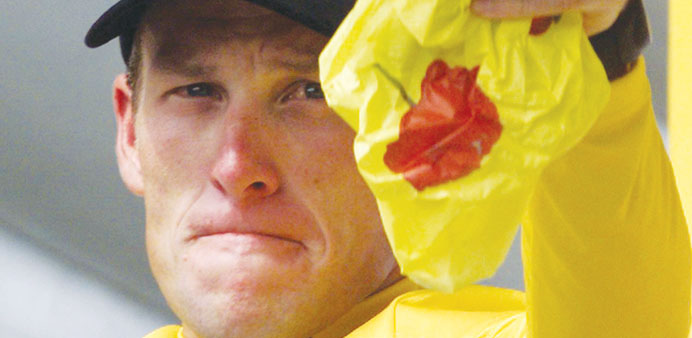By Daniel Garcia Marco, DPA/Miami
A broken down bus stood parked by a remote mountain road in France one night in July 2004: there were orange cones on the tarmac, and the driver was looking into the hood.
The bus was in fact a ploy to dupe police and reporters alike: lying on the floor of the vehicle, Lance Armstrong and US Postal team-mates were having banned blood transfusion.
This is one of the details that Floyd Landis, one of the men who lay on the floor of that bus, told investigators in 2010, according to the book Wheelmen: Lance Armstrong, the Tour de France and the Greatest Sports Conspiracy Ever, written by Wall Street Journal reporters Reed Albergotti and Vanessa O’Connell.
The book, which hit US bookstores Tuesday, reveals as yet unknown portions on the investigation that led Armstrong, the man who was once considered the best cyclist in history, to be banned for life for doping and stripped both of all his wins and of his iconic, celebrity status.
“If he had stayed retired after 2005, this whole thing never would have even been outed,” Albergotti told dpa.
Armstrong, who retired in 2005 but then made a comeback in 2009, had always escaped unscathed from years of allegations of doping, which built up like dust on the seven Tour de France trophies he won between 1999 and 2005.
“The key was that he felt untouchable. So many allegations over the years and none of them had really damaged his reputation. He didn’t think that one more would, but what Floyd had to tell was much more detailed and people would be willing to listen,” Albergotti said.
The author is certain as to Armstrong’s second mistake: “Not making sure that Floyd Landis didn’t talk, because he knew that Floyd had a lot of secrets that he was keeping.”
Landis did talk, and his account was “the most vivid picture ever painted of the secret world of professional sports.”
Among those listening was Travis Tygart, CEO of the US Anti-Doping Agency (USADA), the man who brought down the great American hero and dismantled what Albergotti and O’Connell call “the greatest sports conspiracy ever.”
The phrase is more than just a catchy subtitle for a book.
“There were so many people involved and so much money involved and, beyond the sports, this guy was a hero to so many people who don’t really care nothing about cycling and even sports,” Albergotti says.
“They saw him as an advocate for fighting cancer, a public figure who could even run for governor in Texas at one point. I don’t think that anything like that in sports has really happened before.”
According to the book’s author, the lie held up for as long as it did because many people had “so much to gain and so much to lose if the truth ever came out.”
For 14 years, Armstrong built a lucrative wall of loyalty. Few have dared to talk, either out of self-interest or out of fear. Neither did the singer Sheryl Crow, who was Armstong’s partner over several years of needles and blood until 2006.
“He trusted that Crow would have no desire to tell the press or anyone else about the team’s doping programme. He explained that it was simply part of the sport - that all cyclists were doing the same thing,” the book says, according to excerpts published in the New York Daily News last week.
Crow travelled to Belgium with Armstrong for him to have a blood transfusion in 2004, and she talked to federal authorities about that in 2011, in exchange for protection.
Among the many details the book reveals, Albergotti picks a conversation in which Armstrong tells his inner circle about his concern that taking the banned human growth hormone (HGH) might affect the development of the testicular cancer he overcame in 1996.
Armstrong, 41, currently divides his time between Austin, Texas, and Hawaii. He is focusing on his family and on fighting the legal complaints that are piling up against him, including a government investigation over sponsorship of the US Postal team that could end next month and cost him more than 120 million dollars.
Beyond money, however, Armstrong’s goal remains to be able to compete in triathlon. He insists that he did nothing that most other cyclists did not do as well, and he offered Tygart a full confession in exchange for a one-year ban. Tygart refused and stays firm on an eight-year ban.
Albergotti thinks a full confession may be forthcoming in the context of a reconciliation commission for cycling promoted by Brian Cookson, the new president of the International Cycling Union (UCI).
“I don’t know if it’s going to happen for sure, but there are people working on it,” Albergotti says.

Armstrong: blood, lies, deception
